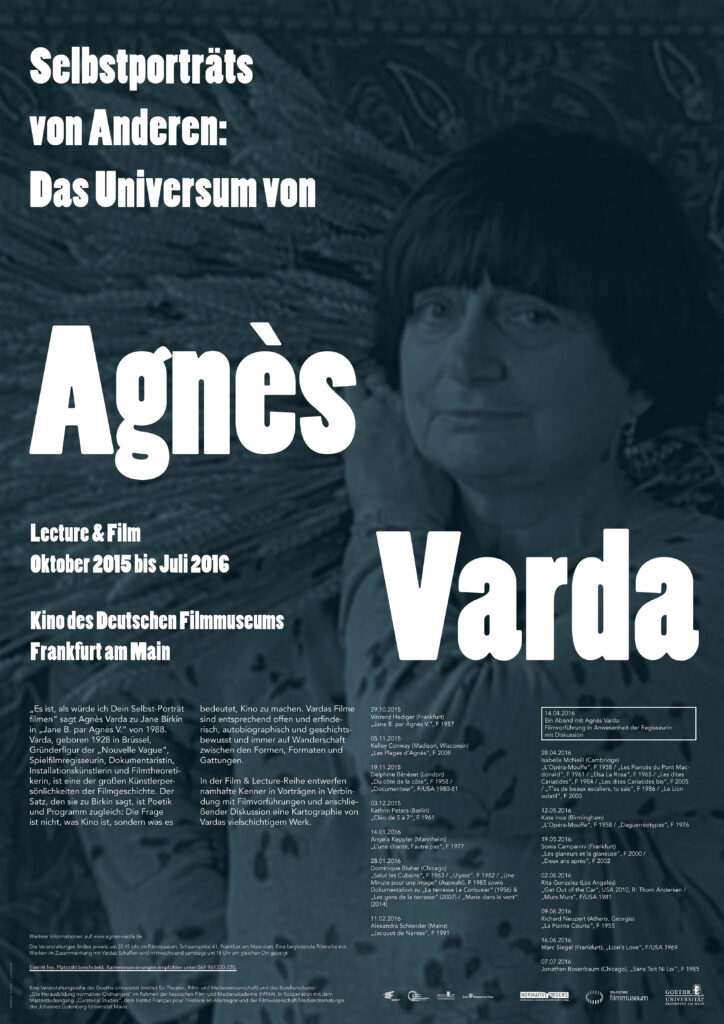Lecture & Film Archive
Here you can find all past editions of the event series Lecture & Film.
AN EYE FOR THE WORLD – The films of Satyajit Ray
2023 – 2024
Satyajit Ray (1921-1992) was the first director from India to achieve global recognition. Equally gifted as a graphic artist, musician, writer and director, Ray created a body of work that transcends all boundaries: Those of genres and arts as well as those of cultures. In the Lecture & Film series “An eye for the world. The Cinema of Satyajit Ray”, connoisseurs of this work explore the question of what continues to make Ray groundbreaking in the post-globalization era.
Organized by the Institute for Theatre, Film and Media Studies at Goethe University Frankfurt and the German Film Institute & Film Museum in cooperation with ConTrust – Trust in Conflict.
Curated by Ritika Kaushik, Vinzenz Hediger and Daniel Fairfax
Supported by the Hessian Film and Media Academy, Goethe University Frankfurt, the Association of Friends and Sponsors of Goethe University and the Foundation for the Promotion of International Relations
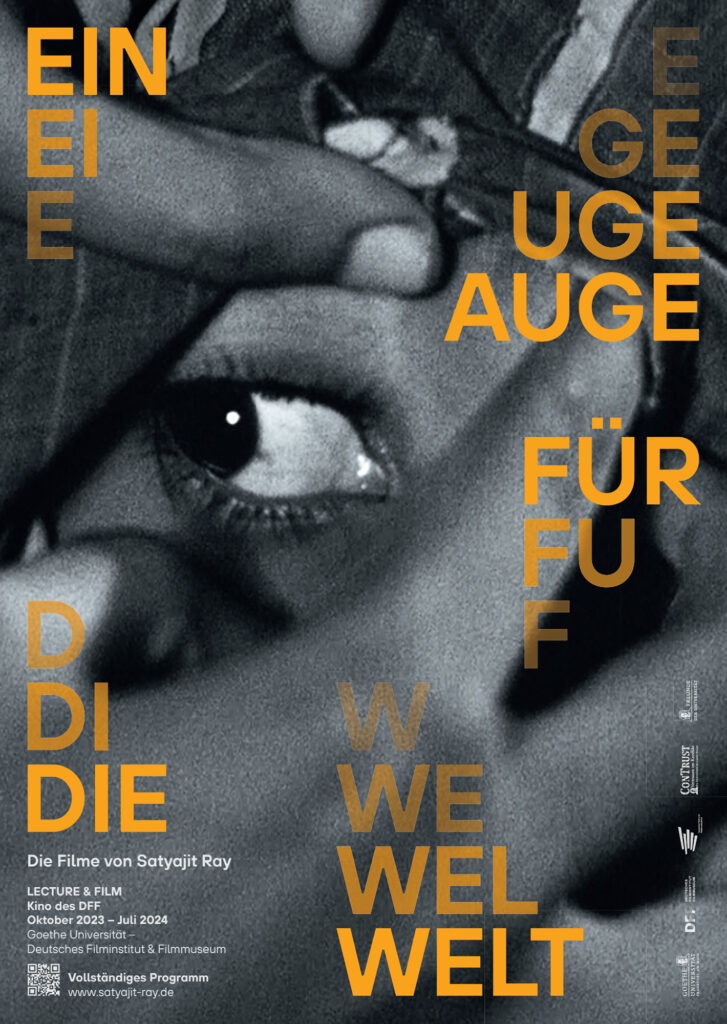
Luis Buñuel: Cinema on the precipice of modernity
2022 – 2023
Luis Buñuel (1900-1983) is a figure of the century, and not just in cinema. With UN CHIEN ANDALOU (1928), he gave surrealism its defining face and cinema a new dimension. Like no other, Buñuel understood cinema as the art of a revolutionary imagination, and like no other he explored the abysses of modernity between utopian hope and secular catastrophe in his films.
The Lecture & Film series “Luis Buñuel: Cinema at the Abyss of Modernity” is organized by the cinema of the DFF – Deutsches Filmmuseum & Filminstitut and the Institute for Theatre, Film and Media Studies at Goethe University together with the research network “Normative Orders”, the research initiative “ConTrust” and the DFG Research Training Group “Configurations of Film” (www. konfigurationen-des-films.de) at Goethe University, in cooperation with the Hessian Film and Media Academy.
Curated by Daniel Fairfax and Vinzenz Hediger
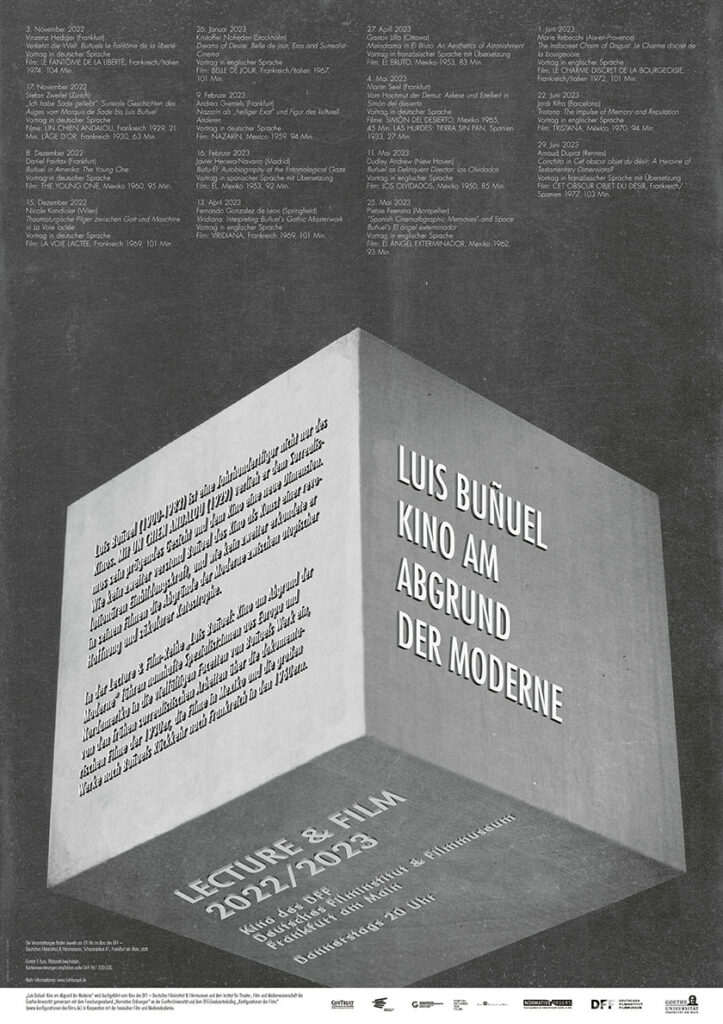
Between surrealism and subversion: the films of Věra Chytilová
2021 – 2022
Věra Chytilová gave cinema a new face in the 1960s with her surrealist-inspired, anarchic cinematic works of art. Together with Milos Forman and Jiri Menzel, she was the protagonist of the Czech New Wave of the 1960s. Unlike Forman and Menzel, who left the country after the suppression of the Prague Spring, Věra Chytilová remained in Czechoslovakia and continued to work tenaciously despite being temporarily banned from her profession.
Over five decades, she created a body of work whose subversive power remains unbroken and whose richness of form in its continuities and ruptures needs to be rediscovered. The “Lecture & Film” series Between Surrealism and Subversion: The Films of Věra Chytilová presents the most important works of Věra Chytilová with introductions by specialists who place Chytilová in the context of the current film studies debate.
Jia Zhangke: Cinema of transformation
2019 – 2021
From a battered agrarian state at the end of the Cultural Revolution to the world’s second largest high-tech economy in just under four decades: Few countries have changed as dramatically as the People’s Republic of China.
The films of Jia Zhangke, one of the most important Chinese directors of our time, are seismograms of this transformation. They counter the breathtaking pace of social upheaval with a precise gaze and a patient rhythm; they respond to heroic rhetoric about the future with a sense for the abortions and abysses of everyday stories. Awarded prizes at festivals around the world, they also open up new possibilities for cinema as an art form.
Organized by the cinema of the DFF – Deutsches Filminstitut & Filmmuseum and the Institute for Theatre, Film and Media Studies at Goethe University together with the research network Normative Orders at Goethe University and the DFG Graduate School“Configurations of Film” in cooperation with the Hessian Film and Media Academy and the Confucius Institute Frankfurt.
Curated by Prof. Dr. Vinzenz Hediger, supervised by Laura Teixeira
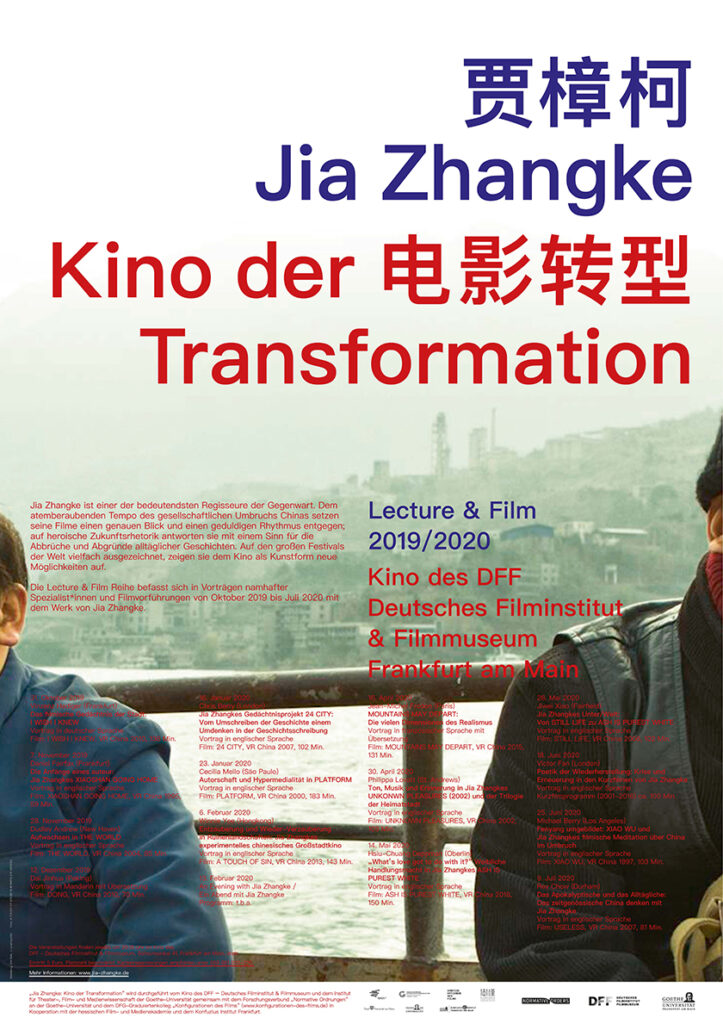
The inventor of forms. The cinema of Chantal Akerman
2018 – 2019
With Godard, cinema becomes historical, with Chantal Akerman it begins anew: The work of Belgian director, installation artist and writer Chantal Akerman is a detailed and multifaceted answer to the question of what is still possible in cinema beyond the almost entirely male heroic story from Griffith to Hitchcock, whose heirs the Nouvelle Vague saw themselves as.
Akerman’s films such as Jeanne Dielman, 23 Quai du Commerce, 1080 Bruxelles, Je Tu Il Elle, D’est or La captive are without precedent in cinema and have shaped the expressive possibilities of film with their pioneering feminist perspectives since their release. Akerman’s aesthetics of everyday experience, her transgression of genre boundaries between feature film, documentary and experimental film, her sense of duration and experience of time beyond the time clock dramaturgy of conventional feature films make her a reinventor of cinematic forms. At the same time, Akerman is a pioneer of the cinematic installation, which she was already thinking through in its basic features in the 1970s, more than two decades before this form became dominant in the art world. As the daughter of Holocaust survivors, Chantal Akerman is also a unique witness to the historical ruptures and upheavals of the 20th century, and her examination of Jewish life permeates her films in a diverse and subtly reflective way. Akerman’s work repeatedly revolves around her relationship with her mother and the question of family affiliation, and she succeeds in turning autobiographical material into the subject matter of cinema like almost no other director before her.
As part of the “Lecture & Film” series “The Inventor of Forms. The Cinema of Chantal Akerman”, Akerman’s companions such as Babette Mangolte, Eric de Kuyper and Claire Atherton, curators such as Tim Griffin and film scholars such as Ivone Margulies, Alisa Lebow, Patricia White and Laliv Melamed will discuss this important work.
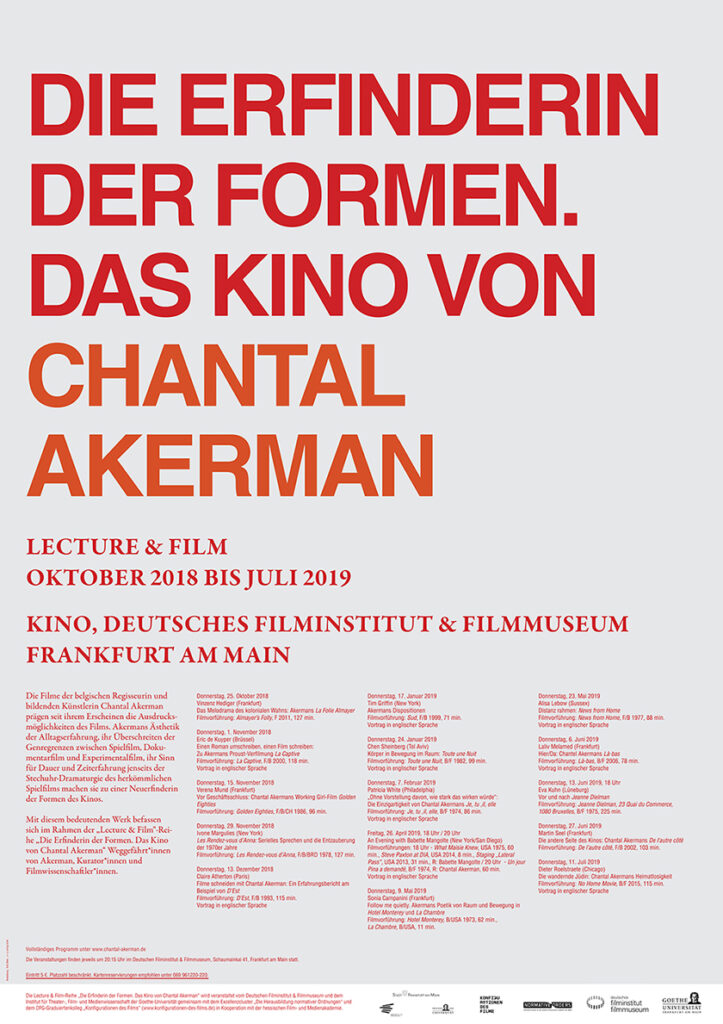
Tropical Underground: Brazilian Cinema Marginal and the Revolution of Cinema
2017 – 2018
Even newer than the new wave was the Cinema Marginal in the Brazilian counterculture of the 1960s and 1970s: an explosion of inventiveness at the interface of underground and genre cinema, triggered by the interference of the military dictatorship in cultural life, linked to the Tropicalia movement in pop music and at the same time a visionary response to globalization. The Lecture & Film series as part of “Tropical Underground” places Cinema Marginal in its context.
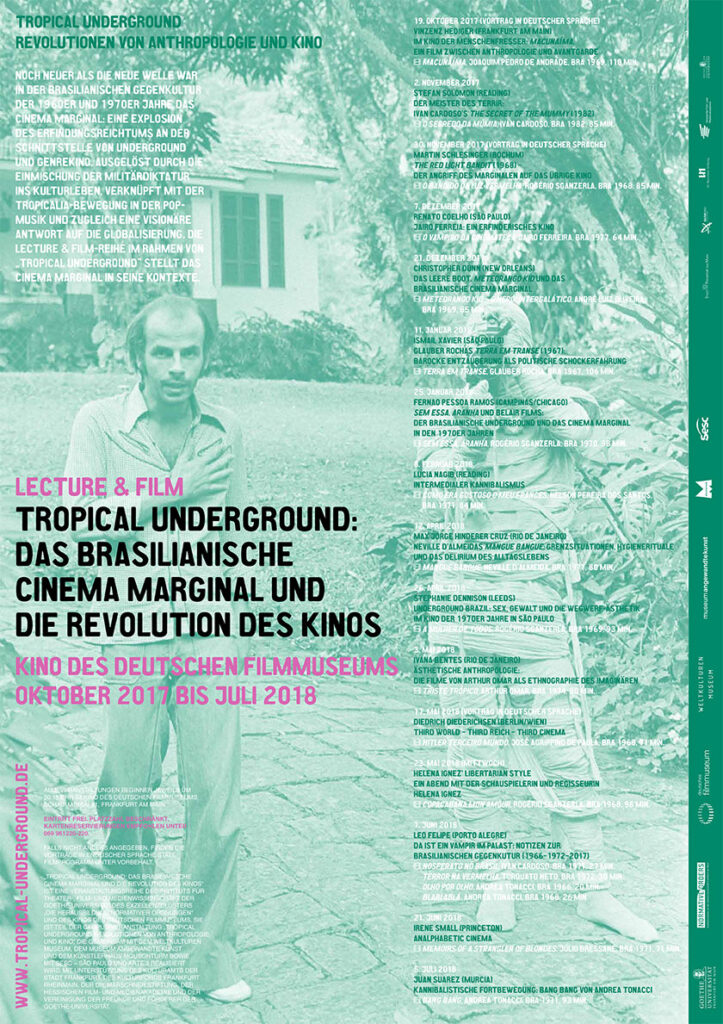
Fast as the joke – The films of Ernst Lubitsch
2016 – 2017
In films by Ernst Lubitsch, it’s all over in an instant. It actually starts with the titles. Who calls his films Der Blusenkönig, Käsekönig Holländer, Die Wohnungsnot or Der G.m.b.H.-Tenor? – and that’s just four of the films by Lubitsch that have gone missing. Lubitsch is fast. He made 11 films in Berlin in 1915 and 5 in Hollywood in 1932, including Trouble in Paradise. Lubitsch is always somewhere else. When Asta Nielsen complained that she had not been able to cry properly in his film, Lubitsch wrote to her openly in 1920: “You still can’t forgive me for letting her cry only 2 meters instead of 5 in a close-up. But believe me, her tears rolled so genuinely from her eyes down her cheeks onto her blouse that the audience was completely moved after 2 meters.” 3 meters more are “superfluous” for him. “[A]dditionally, the doors in his films were always more important to him than the people,” writes Frieda Grafe in “Was Lubitsch berührt. (Fast as the joke)”. Etymologically, witty does not simply mean that there is something to laugh about. Witty is someone who is awake. Who can observe sharply. Has ideas. Is precise. In the military confectioner’s garrison of the Bergkatze, the trumpeter in the oval frame is eating a sausage as he blows the morning roll call. Soldiers in nightgowns loll in four bunk beds next to each other. One of them climbs wearily out of bed, shuffles to the window, looks out. And closes it. The confectioner commander comes into the dormitory, twirls his moustache and shouts something that nobody understands. The pace picks up. Cat wash. The commander leaves, the soldiers jump back into bed. Outside, five soldiers have a chat. The commander sneaks up behind them. His wife tears open another window. First intertitle (after four minutes): “Quiet!”
In the Lecture & Film series, international specialists present new perspectives on the films of Ernst Lubitsch in lectures combined with film screenings and subsequent discussions.
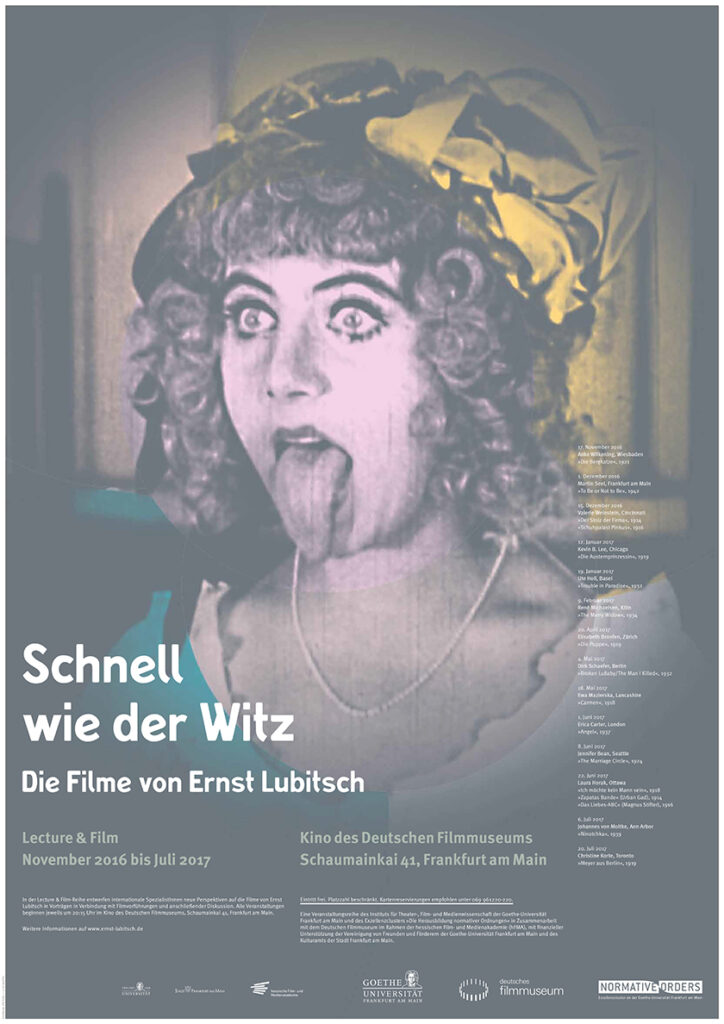
Self-portraits of others: The universe of Agnès Varda
2015 – 2016
“It’s as if I were filming your self-portrait” says Agnès Varda to Jane Birkin in “Jane B. par Agnès V.” from 1988. Varda, born in Brussels in 1928, founding figure of the “Nouvelle Vague”, feature film director, documentary maker, installation artist and film theorist, is one of the great artistic personalities in film history, with an oeuvre that now spans six decades. The sentence she says to Birkin can be understood as poetics and program. For Varda, who – together with Godard, and in dialogue and conflict with him – formed the intellectual gravitational center of the “Nouvelle Vague”, the decisive question is not what cinema is, but what it means to make cinema – for herself, for others, and in interaction with others. Varda’s cinema is correspondingly open and inventive, often autobiographical and always aware of history, multifaceted and always on the move between forms, formats and genres.
In the Film & Lecture series “Self-portraits of others: The Universe of Agnès Varda”, renowned international specialists sketch out a cartography of this multi-layered work in lectures combined with film screenings and subsequent discussion.
